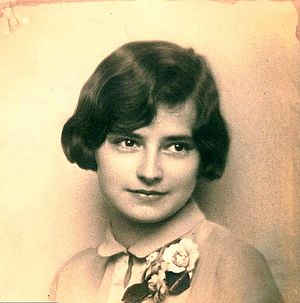Clara Breed facts for kids
Quick facts for kids
Clara Estelle Breed
|
|
|---|---|

Clara Breed in the 1920s
|
|
| Born | March 19, 1906 Fort Dodge, Iowa
|
| Died | September 8, 1994 (aged 88) Spring Valley, California
|
| Other names | "Miss Breed" |
| Alma mater | Pomona College |
| Occupation | Librarian |
| Known for | Support of Japanese American children during World War II |
Clara Estelle Breed (born March 19, 1906 – died September 8, 1994) was an American librarian. She is best known for helping Japanese American children during World War II.
After the attack on Pearl Harbor in 1941, many Japanese American families in California were forced to move. They were sent to special camps far away from their homes. These camps were called Japanese American internment camps. Clara Breed stayed in touch with many of the children sent to these camps. She sent them books and other things they needed. She also visited them often.
Clara Breed worked for the San Diego Public Library for over 40 years. For 25 of those years, she was the head librarian for the city.
Contents
Early Life and Learning
Clara Breed was born in Fort Dodge, Iowa, in 1906. Her father was a minister. Her family lived in New York and Illinois before moving to San Diego in 1920.
She finished San Diego High School in 1923. Then she went to Pomona College, graduating in 1927. She later earned a master's degree in library science. This degree taught her how to be a librarian.
Her Career as a Librarian
In 1928, Clara Breed started working as a children's librarian. She worked at the East San Diego branch library. In 1946, she became San Diego's city librarian. She held this important job for 25 years.
During her time as city librarian, the library system grew a lot. A new main library was built in 1955. Many new branch libraries were also added. She also helped create the Serra Cooperative Library System. This system made it easier for people to borrow books from different libraries. Before this, you could only borrow books from your own city or county library. Thanks to her, people could borrow books from libraries all over San Diego and Imperial counties.
In 1983, she wrote a book about the San Diego library's history. It was called Turning the Pages: San Diego Public Library History, 1882–1982.
Helping Children During World War II
When the United States joined World War II, many Japanese American families were forced to leave their homes. They were moved from San Diego and other West Coast cities. They went to internment camps in Arizona and other places. Many of these children were regular visitors to Clara Breed's library.
Miss Breed noticed that the children changed before they left. They used to be happy and eager to learn. But then they became quiet and sad. On the day they left, many children came to the library. They returned their library cards and said goodbye to Miss Breed. She gave them postcards with her address and stamps. She told them to write to her and tell her what they needed.
When the children wrote, she wrote back. She sent them books and other things like soap and toothbrushes. Many of her young friends were sent to the Poston War Relocation Center camp in Arizona. Miss Breed visited them there many times.
Clara Breed did not agree with the internment policy. This policy was called Executive Order 9066. President Franklin D. Roosevelt started it in 1942. She wrote to members of Congress about it. She also wrote articles about how unfair it was to the children and other Japanese Americans. Her articles appeared in magazines like Library Journal and The Horn Book Magazine.
She also wrote letters asking for college students from the camps to go to school. She also asked for fathers who were separated from their families to be reunited.
Miss Breed received over 250 letters and postcards from the children. One special gift she received was her name carved into wood. One of the children made it for her using a bed spring.
After the War: Recognition
In 1955, Clara Breed was named "San Diego Woman of the Year." In 1991, she was honored at a reunion for people who had been at the Poston Camp. In 1993, President Bill Clinton praised her for her work.
In 1993, she gave all the letters and items she had saved to Elizabeth (Kikuchi) Yamada. Elizabeth was one of her former pen pals. Yamada then gave them to the Japanese American National Museum. The museum showed them in an exhibit called "Dear Miss Breed: Letters from Camp." Now, they are part of the museum's permanent collection.
The Smithsonian Institution even used some of the "Dear Miss Breed" letters. They made a lesson plan about how letters can be important historical documents. A book about her, Dear Miss Breed: True Stories of the Japanese American Incarceration during World War II and a Librarian Who Made a Difference, was published in 2006.
In 2007, Clara Breed was added to the San Diego Women's Hall of Fame. In 2014, she was also inducted into the California Library Hall of Fame.
 | Aurelia Browder |
 | Nannie Helen Burroughs |
 | Michelle Alexander |

